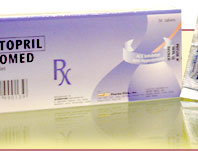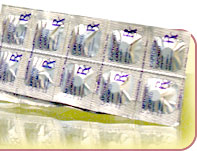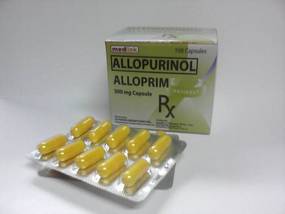ALLOPRIM
(Allopurinol)
FORMULATION:
Each capsule contains:
Allopurinol ……………………………………………………….300 mg
PHARMACOKINETICS:
Up to 90% of a dose of allopurinol is absorbed from the gastrointestinal tract after oral administration; its plasma half-life is about 1 to 2 hours. Allopurinol’s major metabolite
is oxypurinol (alloxanthine) which is also an inhibitor of xanthine oxidase with a plasma half-life of about 15 or more hours in patients with normal renal function, although this
is greatly prolonged by renal impairment. Both allopurinol and oxipurinol are conjugated to form their respective ribonucleosides. Allopurinol and oxipurinol are not bound to plasma proteins. Excretion is mainly through the kidney, but it is slow since oxipurinol undergoes tubular reabsorption. About 70% of a daily dose may be excreted in the urine as oxipurinol and up to 10% as allopurinol; prolonged administration may alter these proportions due to allopurinol inhibiting its own metabolism. The remainder of the dose is excreted in the feces.
Allopurinol and oxipurinol have also been detected in breastmilk.
INDICATIONS:
Used to treat hyperuricemia associated with chronic gout,urate nephropathy, recurrent uric acid stone formation, enzyme disorders and cancer chemotheraphy.
DOSAGE:
Mild to moderate gout: 300 mg (one capsule) daily
Moderate to severe gout: 300 mg to 600 mg (one to two capsules) daily
Or as prescribed by the physician.
ADVERSE EFFECTS:
The most common side effect of allopurinol is skin rash. Rashes are generally maculopapular or pruritic, but more serious hypersensitivity reactions may occur and include exfoliative rashes, the Stevens-Johnson syndrome, and toxic epidermal necrolysis. It is therefore recommended that allopurinol be withdrawn immediately if a rash occurs. Further symptoms of hypersensitivity include fever and chills, lymphadenopathy, leucopenia and leucocytosis, eosinophilia, arthralgia and vasculitis leading to renal and hepatic damage and, very rarely, epilepsy. These hypersensitivity reactions may be severe, even fatal, and patients with hepatic or renal impairment are at special risk. Hepatotoxicity and signs of altered liver function may also be found in patients not exhibiting hypersensitivity.Many other side effects have been noted rarely and include paresthesia, peripheral neuropathy, alopecia, hypertension, taste disturbances,nausea, vomiting, abdominal pain, diarrhea, headache, drowsiness and vertigo. Patients with gout may experience an increase in acute attacks on beginning treatment with allopurinol, although attacks usually subside after several months.
PRECAUTIONS:
Allopurinol should be administered with care to patients with renal and hepatic impairment and in nursing mothers as it has been reported to be excreted in breast milk. Allopurinol should not be used for the treatment of an acute attack of gout. Additionally, allopurinol should not be initiated for any purpose during an acute attack.
CONTRAINDICATIONS:
Allopurinol should not be reintroduced in those patients who have experienced other forms of hypersensitivity reactions.
INTERACTIONS:
Drugs that can increase acid uric concentrations may decrease the efficacy of allopurinol. Aspirin and the salicylates possess this activity and should generally be avoided in hyperuricemia and gout. An increase in hypersensitivity reactions, and possibly also other effects, has been reported in patients receiving allopurinol with ACE inhibitors or thiazide diuretics particularly in patients with impaired renal function.
The metabolism of azathioprine and mercaptopurine is inhibited by allopurinol and their doses should be reduced to one-quarter to one-third of the usual dose when either of them is given with allopurinol to avoid potentially life-threatening toxicity. There have also been reports of allopurinol enhancing the activity of, and possibly increasing the toxicity of a number of other drugs including some antibacterials, some anticoagulants, some neoplastics, ciclosporin, some sulfonylureas antidiabetics, theophylline and vidarabine.
CAUTIONS:
Foods, Drugs, Devices and Cosmetics Act prohibits dispensing without prescription.
AVAILABILITY:
Box of 100 blister foiled capsules.
STORE AT TEMPERATURES NOT EXCEEDING 30°C.
Manufactured by:
HIZON LABORATORIES, INC.
Assumption Road, Sumulong Highway,
Antipolo City
Exclusively Distributed by:
METRO DRUG INC.
Mañalac Ave., Bagumbayan, Taguig City
Under the Authority of:
MEDLINK PHARMA PHILS., INC,
Suite 2002 20th Floor, Prestige Tower
Emerald Ave., Ortigas Center,Pasig City
<< Back to All Products





